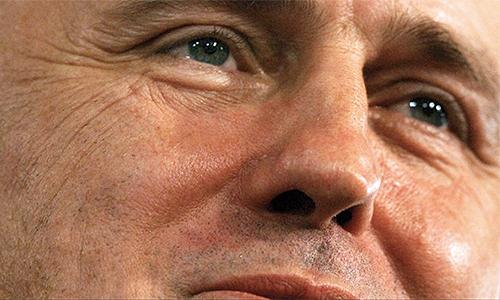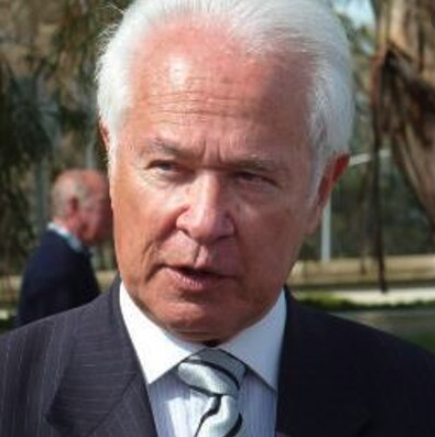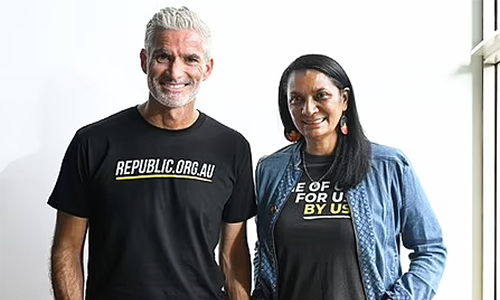
by DAVID FLINT – IF AUSTRALIA’S republican establishment had had its way, we could have found ourselves in a predicament similar to France’s today.
The news from France, as well as Rupert Murdoch’s surprise answer when asked whether we would be a republic within 10 years, reminded me of this. He replied: “Without a doubt”.
- The first Keating-Turnbull republic model would have similarly allowed for unstable governance in Australia.
- When this was pointed out, they produced a second model. This went to the other extreme.
- This was to be a president instantly dismissible by a prime minister, without grounds and without right of appeal.
He dismissed the 1999 landslide by blaming John Howard for the “very clever … way he designed the (referendum) question”.
Having been intimately involved in arguing the case for changing the question, I can testify that John Howard had absolutely nothing at all to do with the wording of the question. This was all the work of self-styled republican politicians.
TERROR
As to France, the reason why it has a Fifth Republic, with even calls for a sixth, is best understood by noting that in the time Australia was settled in 1788 to today, France has had five republics, four monarchies, two Napoleonic empires, two Paris Communes (1792-95 and 1871), and one each of a reign of terror and a Nazi- collaborationist regime, the Vichy government.
This demonstrates, surely, that France has had great difficulty finding a lasting constitutional model like ours in Australia, one of the world’s oldest continuing democracies.
Designed for Charles de Gaulle by lawyer and later prime minister Michel Debré, the Fifth Republic was an extraordinary attempt to combine an American-style presidency with the Westminster system.
The result should have been obvious. This is “cohabitation”, where a powerful president and the government come from opposing Parties.
This year, President Macron was outraged when Marine Le Pen’s Rassemblement National (RN), the Party of the woman he had defeated twice in presidential elections, received the largest vote, 31.4 per cent, in the EU election.
No doubt, his fear was that in the 2027 presidential election, she could succeed him as president.
Despite being in his final term and working with a government led by his Ensemble coalition, he risked cohabitation by calling a snap election for the 577-seat French National Assembly. Cohabitation may now occur.
With only 20 per cent of the vote, Macron’s coalition performed worse in the first round than any other governing coalition, well behind the RN’s 33 per cent.
With the second round, the Nouveau Front Populaire, a communist-Trotskyist-socialist-Greens coalition, dominated by an often alleged anti-Semite Jean-Luc Mélenchon, led with 182 seats.
Macron’s Ensemble coalition won 168 seats and Le Pen’s RN 143.
This is very much a hung parliament.
Alain Duhamel is a leading French commentator and author of Le Prince balafré: Emmanuel Macron et les Gaulois (très) réfractaires, an authoritative book that presents Macron as a scarred leader trying to run an unmanageable France.
Duhamel observed that Macron’s reaction was widely seen as an overreaction of “wounded pride, a lesson to the French people who voted badly”.
BETRAYAL
It is among Macron’s very own supporters that Duhamel finds the strongest incomprehension of his decision, seeing it as a betrayal by an increasingly authoritarian and arrogant leader.
It is relevant to recall that the first Keating-Turnbull republic would have similarly allowed for unwelcome periods of cohabitation in Australia.
The design of that republic was presented in detail to parliament in 1995 in Paul Keating’s 5288-word statement, An Australian Republic: The Way Forward.
This was his response to the 1993 report of the taxpayer-funded nine-person Republic Advisory Committee, which consisted only of selected republicans and was chaired by the head of the republican movement, Malcolm Turnbull.
Its task was not to advise whether Australia should become a republic or, indeed, whether it was already a republic, a crowned republic, as two former prime ministers and others maintain.
Nor was it to fulfil the original constitutional intention of the founders to make the politicians more accountable.
According to the terms of reference, its role was to develop an options paper describing “the minimum constitutional changes necessary to achieve a viable Federal Republic of Australia”. Keating’s statement claims this would be only a “small step”.
The late eminent republican constitutionalist and convention delegate, Professor Patrick O’Brien, described this claim as “false”.
Rather, he said, it would be a “giant leap”. The statement is replete with references to the need for an Australian Head of State.
This conflicts with the fact that whenever a government sends a governor-general on a state visit to a foreign country, the government of that country is always informed that the governor-general is the Australian Head of State.
In addition, the Keating government’s Official Guide: Commonwealth Government Directory declared unequivocally that “the Governor-General is the Head of State”.
The Keating-Turnbull model was the one the establishment republicans, led by Turnbull, took to the 1998 Constitutional Convention.
IGNORED
Whenever I pointed out that transferring the powers of the governor-general to a president elected and removable by a two-thirds vote of a joint sitting of parliament would obviously import something like the cohabitations and other problems of the Fifth Republic, this was either denied or ignored.
This was despite the obvious fact that if the president did something that upset the government, no opposition would join in removing him if they approved of the president’s position, as would often be likely.
But when a convention delegate with a Labor background, a former judge and governor of Victoria, Richard McGarvie and others came to the same conclusion, the republican establishment began to take notice. They produced their second model. This went to the other extreme.
Instead of a president difficult to remove, they proposed something unknown in the world or in history and nothing like the present system.
This was to be a president who would be instantly dismissible by the prime minister, without grounds, without notice and without any right of appeal.
Constitutional design is clearly not one of the strengths of the republican establishment.
As republican politicians rush to be seen with the King on the coming royal visit, Australians may remember the fate they have avoided by not becoming a politicians’ republic.
Well may we say, if it ain’t broke, don’t fix it.PC













Notice how some colonials like to claim a Foreign Monarch’s appointed representative should be our head of state.
But when you call them out on it – and the inference that Australia’s head of state is inferior to the head of state of a foreign power – they suddenly don’t want to talk about it.
It is as pathetic as it is predictable.
C’mon John W.
Tell us why Australia’s head of state should be constitutionally obliged to keep the UK’s head of state ‘pleased’.
Monarchists want Australia’s head of state to be inferior to the person who is another country’s head of state. How pitiful.